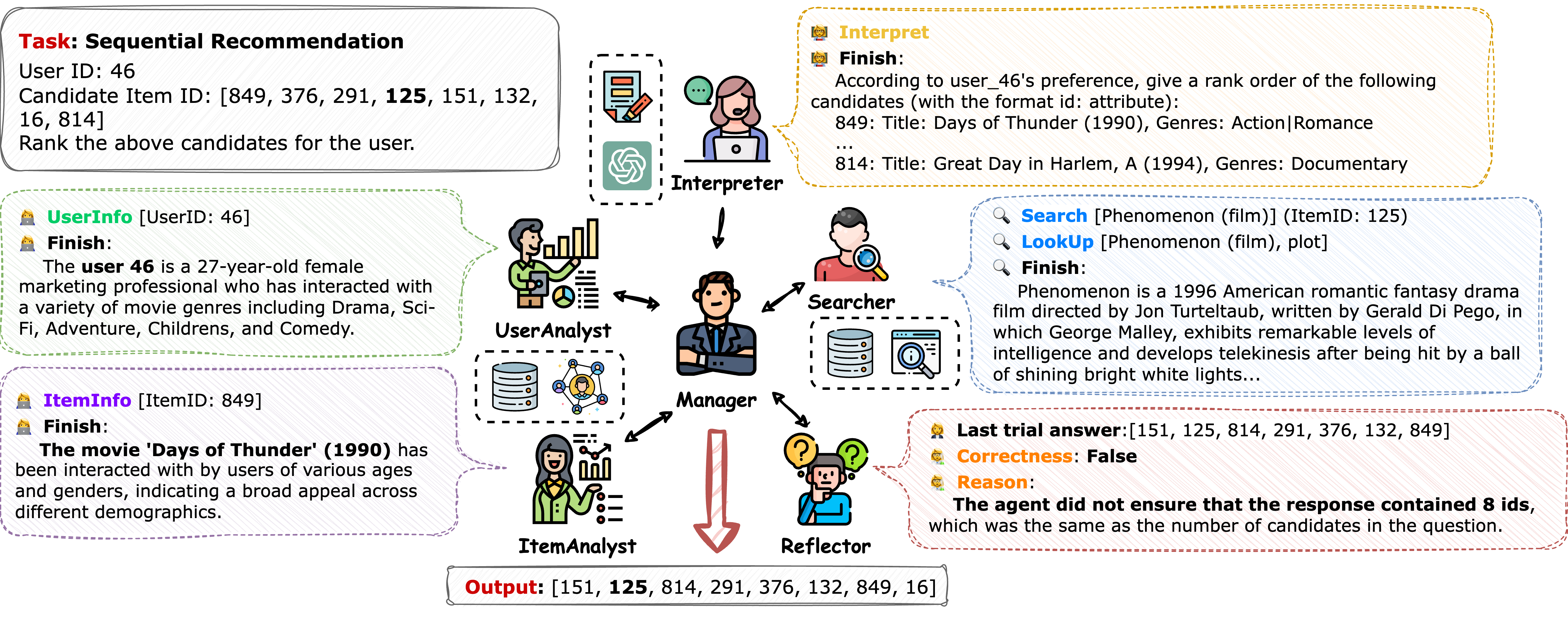This repository contains the official implementation of our SIGIR 2024 demo paper:
The video demo is available at Video Demo.
A demo of using MACRec:
macrec.mp4
macrec/: The source folder.agents/: All agent classes are defined here.analyst.py: The Analyst agent class.base.py: The base agent class and base tool agent class.interpreter.py: The Task Interpreter agent class.manager.py: The Manager agent class.reflector.py: The Reflector agent class.searcher.py: The Searcher agent class.
dataset/: All dataset preprocessing methods.evaluation/: The basic evaluation method, including the ranking metrics and the rating metrics.llms/: The wrapper for LLMs (both API and open source LLMs).pages/: The web demo pages are defined here.rl/: The datasets and reward function for the RLHF are defined here.systems/: The multi-agent system classes are defined here.base.py: The base system class.collaboration.py: The collaboration system class. We recommend using this class for most of the tasks.analyse.py: (Deprecated) The system with a Manager and an Analyst. Do not support thechattask.chat.py: (Deprecated) The system with a Manager, a Searcher, and a Task Interpreter. Only support thechattask.react.py: (Deprecated) The system with a single Manager. Do not support thechattask.reflection.py: (Deprecated) The system with a Manager and a Reflector. Do not support thechattask.
tasks/: For external function calls (e.g. main.py). Note needs to be distinguished from recommended tasks.base.py: The base task class.calculate.py: The task for calculating the metrics.chat.py: The task for chatting with theChatSystem.evaluate.py: The task for evaluating the system on the rating prediction or sequence recommendation tasks. The task is inherited fromgeneration.py.feedback.py: The task for selecting the feedback for the Reflector. The task is inherited fromgeneration.py.generation.py: The basic task for generating the answers from a dataset.preprocess.py: The task for preprocessing the dataset.pure_generation.py: The task for generating the answers from a dataset without any evaluation. The task is inherited fromgeneration.py.reward_update.py: The task for calculating the reward function for the RLHF.rlhf.py: The task for training the Reflector with the PPO algorithm.sample.py: The task for sampling from the dataset.test.py: The task for evaluating the system on few-shot data samples. The task is inherited fromevaluate.py.
utils/: Some useful functions are defined here.
config/: The config folder.api-config.json: Used for OpenAI-like APIs' configuration. We give an example for the configuration, namedapi-config-example.json.agents/: The configuration for each agent.prompts/: All the prompts used in the experiments.agent_prompt/: The prompts for each agent.data_prompt/: The prompts used to prepare the input data for each task.manager_prompt/: The prompts for the Manager in theCollaborationSystemwith different configurations.old_system_prompt/: (Deprecated) The prompts for other systems' agents.task_agent_prompt/: (Deprecated) The task-specific prompts for agents in other systems.
systems/: The configuration for each system. Every system has a configuration folder.tools/: The configuration for each tool.training/: Some configuration for the PPO or other RL algorithms training.
ckpts/: The checkpoint folder for PPO training.data/: The dataset folder which contains both the raw and preprocessed data.log/: The log folder.run/: The evaluation result folder.scripts/: Some useful scripts.
-
Make sure the python version is greater than or equal to 3.10.13. We do not test the code on other versions.
-
Run the following commands to install PyTorch (Note: change the URL setting if using another version of CUDA):
pip install torch --extra-index-url https://download.pytorch.org/whl/cu118
-
Run the following commands to install dependencies:
pip install -r requirements.txt
-
Run the following commands to download and preprocess the dataset (including
ml-100kandAmazon Beauty):bash ./scripts/preprocess.sh
Use the following to run specific tasks:
python main.py -m $task_name --verbose $verbose $extra_argsThen main.py will run the ${task_name}Task defined in macrec/tasks/*.py.
E.g., to evaluate the sequence recommendation task in MovieLens-100k dataset for the CollaborationSystem with Reflector, Analyst, and Searcher, just run:
python main.py --main Evaluate --data_file data/ml-100k/test.csv --system collaboration --system_config config/systems/collaboration/reflect_analyse_search.json --task srYou can refer to the scripts/ folder for some useful scripts.
Use the following to run the web demo:
streamlit run web_demo.pyThen open the browser and visit http://localhost:8501/ to use the web demo.
Please note that the systems utilizing open-source LLMs or other language models may require a significant amount of memory. These systems have been disabled on machines without CUDA support.
If you find our work useful, please do not save your star and cite our work:
@inproceedings{wang2024macrec,
title={MACRec: A Multi-Agent Collaboration Framework for Recommendation},
author={Wang, Zhefan and Yu, Yuanqing and Zheng, Wendi and Ma, Weizhi and Zhang, Min},
booktitle={Proceedings of the 47th International ACM SIGIR Conference on Research and Development in Information Retrieval},
pages={2760--2764},
year={2024}
}
